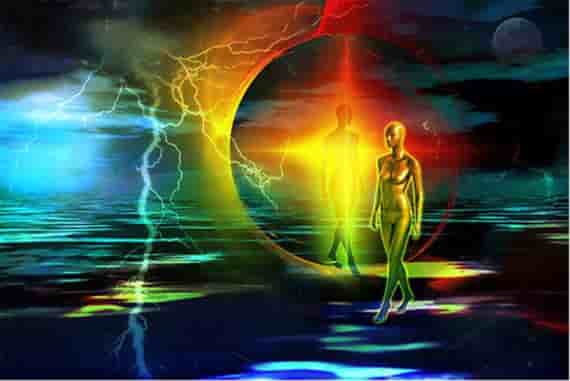Welcome to our channeled mini-series to be aired for the next few Tuesday’s courtesy of blog member, Ash. Please enjoy!
I first came to CE last October – a complete novice on all things spiritual. I can say that it was no accident, we’ve all come here for a reason. Elisa and Erik are the reason I started my own journey, and what a journey it has been. I know that my purpose here, for now, is to help those around me. That seems pretty vague, but I like to think it’s just broad – I can help anyone who is led to me, in whatever way they need at that time. I can only assume that I am getting this partly because my own understanding has grown in leaps and bounds, and continues to do so even now – and I’m now able to make connections between things that I could not see before (Amazing Grace! I once was blind, but now I see!). One of my guides is with me specifically for spiritual development, and I think has been instrumental in my sudden bursts of understanding. The information in this series is actually cobbled together bits and pieces of my conversations with various people over the last couple of months – people who were strangers who not so coincidentally crossed my path. In our conversations, I found that I was saying things that I never knew I knew! I suppose it was truly “remembering.” So I’ve sort of stitched all of those conversations together in a single, fluid explanation which I hope will help everyone at Channeling Erik see the connection between all things spiritual – including religion. So here it goes….
Scientifically-minded skeptics like to scoff at any and all religious beliefs as well as the supernatural – but technically speaking, science IS their religion. Their doctrine is material information, and their book is tangible, repeatable results. They want “evidence” to prove the existence of a God, but all of reality is subjective-even theirs. And absence of evidence is not evidence of absence. How many spiritual experiences (their evidence!) have they ignored simply because they did not believe it possible? A closed mind is a wasted thing.
Every mental construct that we have created throughout our lives has created a frame of reference, so to speak, for our own version of reality.
What I’ve spent the last nine months trying to do is break down all of those mental barriers- all the conditioned responses, all the social constructs. I’ve referred to it as “unlearning.” All of those things cause us to form an opinion – on everything! That includes Science – it’s focus is the physical, tangible reality. What I’ve found is – you can only see something for what it really is – the Truth – when you have no opinion at all.
I read an example Erik gave us a while back. At the time I thought I understood what it meant, but I realized I didn’t fully comprehend it until just a few days ago. Erik used facets of a diamond, but for simplicity’s sake, I’m going to use a cube.
Say you have this cube – the cube represents Truth. Christians are looking at the right side of the cube. Politics looks at the left side. Scientists are looking at the bottom of the cube. Psychologists look at the top of the cube. And insert any other discipline to look at the front and the back – it doesn’t matter.
Each one of the sides of the cube is Truth. A single side just represents a viewpoint, an opinion, a frame of reference – it’s Truth from one angle – but it’s still Truth. The only way you can see the whole of Truth is to pull back and look at the entire thing objectively – pull away from the single frame of reference. It’s at that point you realize that the whole of it – together – is truth. All of us – the Christians, the Buddhists, the Scientologists and the Scientists are arguing about who is right. But we are all right! We are all looking at the Truth through our own frame of reference and we can’t identify with any of the other frames until we look at the whole cube and not just one side.
We have such a hard time pulling away from a frame of reference (or rather, looking at something objectively) because every single thing we think and do is in some way in relevance to something else – we can’t fully comprehend what a thing means to us without knowing it’s opposite – this is yin and yang – the opposing forces, balancing one another. You can not know what love is, if you do not know fear. That’s why we’re here. To experience and learn. Or more accurately – to experience and remember.
So many people will misinterpret this to mean being able to see both sides of an argument, and it is that, to a certain degree. But “agreeing to disagree” is not what it’s about… because if you agree to disagree, both parties still believe their view is correct – that their view is better than the other, when in fact, that is just an opinion. Sure, there are certain parts of a viewpoint that are based on incorrect information. It happens, and those are the finer points that you can say, “This is incorrect because (insert statement of fact here).” Perhaps it’s just part of the human condition, and that’s why it pervades every aspect of our lives and causes a shit ton of social problems in the process.
So essentially – in ALL THINGS – even where we disagree, we are all looking at the same thing, and describing the same thing – only we each interpret it differently. Those are our subjective psychological realities that we are creating with our thoughts.
If we take a good look at creation mythology from various religions around the world, we’ll find some interesting similarities between religions and science.Everybody knows the Christian story of creation – God created the Heavens and the Earth, and then the Garden of Eden and all the animals, and then last he created his crowning jewel – Adam, from the earth itself – and he did it all in just seven days. There’s a lot of debate between Creationists and Evolutionists about what we should teach our kids. If the story of creation is real, then the theory that there was a huge space explosion that flung matter into the far corners of the Universe that somehow made an evolutionary leap from stardust to plant life to animal life to humanity over millions of years doesn’t exactly coincide. And a lot of other religions have creation myths that aren’t exactly compatible, either. How can these possibly be the same?The Hebrew word for “Adam” literally means “dust.” We already knew that, right? God made Adam from dust. But did you also know that it can also mean “stardust?” And that “Eve” means “life?” And since Eve was created from Adam’s rib…we could very easily posit “From stardust, God created life.” Wow. Sounds a lot like the big bang, afterall! And God first created the earth, and then the plants, and then the animals and then humans? That sounds a lot like the stages of evolution. And thanks to my friend Thomas, a theology and philosophy student, for enlightening me to the meanings in the Hebrew language.We can also compare that to the Mayan creation myth. The Mayans say God first created the earth, then the plants, then the animals, and then tried to create man three times, but failed. Each time, God created man out of a different substance – first mud, but that didn’t work out, so he destroyed them. Then he tried trees, but that didn’t work out either, and all the tree people fled to the forest and turned into monkeys. Ok…so first men were mud, then men were plants, then men were animals – also sounds a lot like the stages of Evolution. Picking up on a theme here?
In case you’re curious, the final creation of man, according to the Maya – the one that stuck – was corn. They made man out of corn and that was the final version. Does this mean the Maya literally think they came from corn? I doubt it. What you have to ask yourself is: What did corn symbolize to the ancient Maya? See – it’s not always literal. Interestingly enough, the Maya also describe a great flood which destroyed one of the previous creations of man. So does the Bible. Coincidence?
Let’s look at the Hindu creation myth for a second. According to the Hindus, Vishnu, Lord Siva (also known as Maheshwara) and Brahma, are considered as the supreme Trimurti in Hinduism, are not three separate Gods, but three manifestations of the same Supreme soul, Brahman.
In the story, the universe and everything in it was created by Brahma – actually manifested THROUGH Brahma, the creator manifestation of the supreme soul. Let that sink in for a moment – everyone wants to call Hindusim a polytheistic religion because they have 700 some odd Gods, but if my understanding is correct, those 700 gods are manifestations – different aspects or expressions, if you will, of a single God. Kind of like the Holy Trinity on steroids.
In the beginning, there was only Avyactha, or ‘The inexpressible.’ In this emptiness, Lord Vishnu, the preserver appeared (Remember, Vishnu is a manifestation of Brahman) in the form of a child, lying on the leaf of a banyan tree. As soon as he appeared in this form, his mind was filled with doubts about his identity. Then his questions were answered by an unmanned voice- the voice of the supreme soul (Brahman), which is his true form.
Now think about that parallel for a moment – Christians often think they’ve heard the voice of God speak to them. Instead of writing them off as a religious lunatic, as most people would, questioned them further. Having a good understanding of how psychic phenomena works can explain a lot of this. Does the voice come from outside or within? Is it your own voice or a different voice? I would bet that in most cases, when people think they’ve heard the voice of God, they’re really hearing their higher self, or maybe a guardian angel or a guide… although higher self info DEFINITELY comes from within, is very loud and clear and probably pretty “god-like.”
So – you hear a big booming voice in your head, and you call it your higher self. A Christian calls it God. In reality, your higher self, and you, are both manifestations of your true form (God!) so it’s really the same thing from two varying perspectives.
At the moment of Vishnu’s manifestation, his mind was immediately filled with doubts about his true identity. He did not know who he was, he didn’t know that he was a manifestation of Brahman. But why? New Age philosophy teaches that we are born into a state of unknowing – we already know everything there is to know, but we’ve forgotten it, and the purpose of being here is to remember. Spiritists and Mediums speak of the “veil” – the thing that keeps us from knowing that spirits are all around us. Sometimes it’s referred to as “The Veil of Forgetfulness” – we move from the spirit realm into an incarnated body (like Vishnu did) and we forget who we really are. So, from the moment of our birth, we are filled with unknowing – no knowledge of who we were. No knowledge about this world, a state of innocence, for sure, but also a state of doubt about our original identity.
Is there a biblical parallel to this? You betcha. Adam and Eve were innocent in the Garden of Eden. They had no knowledge of good and evil until that embarrassing apple incident. Once they ate the fruit of the tree of knowledge, their eyes were opened to duality, and they were cast out of Eden… paradise. Being “cast out of Eden” is analogous to leaving the spirit realm – to be born into a physical body and experience the good and evil of duality. And we pass through the veil on the way – forgetting who we are, like Vishnu. But we always have access to home, by looking within.
Thanks for you insight, Ashley! You never cease to amaze us all.



